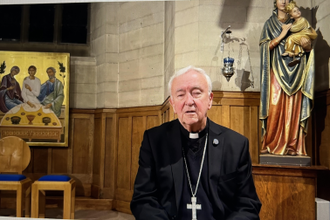Pope advises Diplomatic Corps: Build peace with justice, truth, and hope

Pope with Diplomatic Corps. Image: Vatican Media
Source: Vatican Media
Pope Leo XIV addressed members of the Diplomatic Corps accredited to the Holy See on Friday morning.
He began by paying tribute to Ambassador George Poulides of Cyprus, outgoing Dean of the Corps, praising his years of "energy, commitment and kindness," as well as the esteem he earned from Pope Francis and previous Popes.
The Pope then reaffirmed the Church's commitment to serve all humanity, describing the diplomatic community as a family "that shares the joys and sorrows of life" and is grounded in human and spiritual values.
The Pope went on to note that in this family the Church does not seek privileges but rather looks for opportunities to build bridges, particularly through its distinctive form of diplomacy rooted in pastoral concern.
Pope Leo XIV said this mission echoes the legacy of Pope Francis, whose commitment to the poor and the marginalised, as well as his attention to the protection of creation and the rise of artificial intelligence, remains a constant and ongoing inspiration.
Reflecting then on his own life, which has taken him across North and South America and Europe, the Pope expressed his personal desire to "transcend borders," and to deepen the Church's relationship with peoples and nations throughout the world.
At the heart of the Pope's address were three essential words, which he identified as the pillars of the Church's missionary activity and the foundation of the Holy See's diplomatic engagement: peace, justice and truth.
The first word, peace, he described not as the mere absence of war, but as a demanding and active gift, "the first gift of Christ". True peace, he continued, must begin in the human heart, through humility, careful speech, and the rejection of both pride and vengeance. This, he continued, refers to words as well, since "not only weapons can wound and even kill".
With this in mind, Pope Leo XIV emphasised the indispensable role of religious freedom and interreligious dialogue in cultivating peace. He called for a renewal of multilateral diplomacy and a decisive halt to the arms race, echoing Pope Francis' final Urbi et Orbi message, in which he warned, as he often did, that "no peace is possible without true disarmament".
Turning then to the second word, justice, Pope Leo reflected on the memory of Pope Leo XIII and the Church's rich tradition of social teaching. With the world facing ever deepening global inequalities, Pope Leo urged leaders to invest in the family and to uphold the dignity of every human person.
He then shared a brief reflection on his own identity as the child of immigrants, and called for greater solidarity, rooted in the shared human dignity of all people, regardless of circumstance or nationality.
Finally Pope Leo spoke about truth, describing the essential need for authentic communication and peaceful relations. In a world where reality is often distorted, especially online, the Pope insisted on the Church's duty to speak truth with charity, even when difficult or misunderstood.
"Truth," he said, "is not an abstract principle but an encounter with the person of Christ". It is this truth, he continued, that allows humanity to face its most urgent challenges, such as migration, technology or the environment, with unity and shared purpose.
Pope Leo XIV concluded by placing his ministry within the context of the Jubilee Year of Hope, which he described as a time for conversion, renewal, and above all, for leaving conflict behind.
He renewed the Holy See's commitment to walking alongside every nation in building a world where all may live with dignity and peace, saying: "It is my hope that this will be the case everywhere, starting with those places that suffer most grievously, like Ukraine and the Holy Land."
Read the full text of Pope Leo XIV's address to Members of the Diplomatic Corps accredited to the Holy See:
www.vatican.va/content/leo-xiv/en/speeches/2025/may/documents/20250516-corpo-diplomatico.html


















